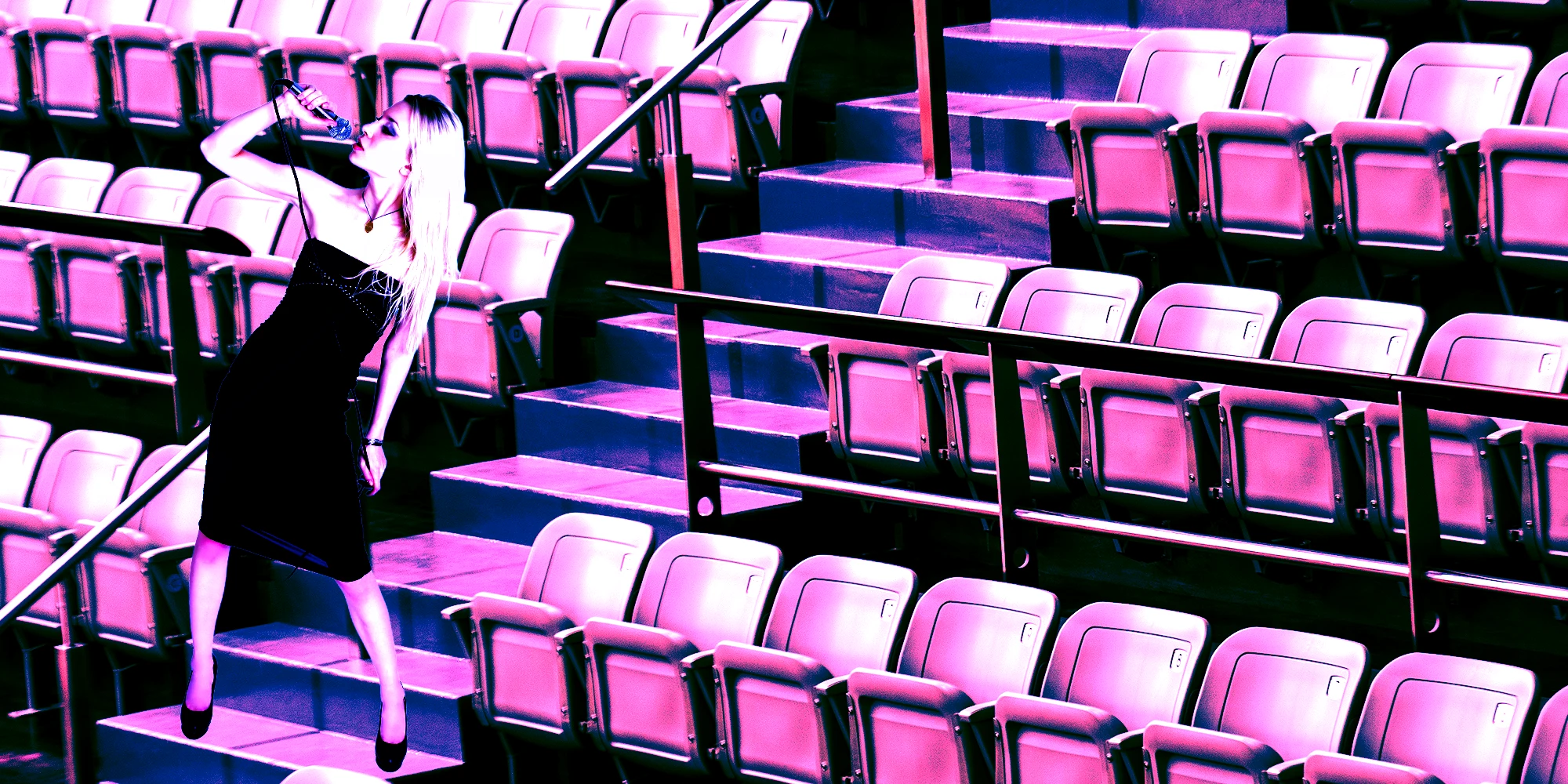The Great Concert Ticket Bust

Big musical acts are canceling tours. Are Taylor Swift and Beyoncé the only artists who can sell out shows?
It’s probably really great to be Jennifer Lopez. Of my running mental list of people whose lives seem absolutely awesome, she easily falls within the top 10. But just because she lives a charmed life doesn’t mean things go great all of the time, and, lately, things have been a little less than ideal for the actor/singer/dancer from the Bronx. Her relationship with Ben Affleck is said to be on the rocks, and beyond any personal woes, she’s got professional pains, too. Namely, JLo is apparently having a hard time selling tickets.
Lopez announced a tour to support her new album (and truly wild accompanying movie), “This Is Me … Now,” earlier this year, but she wound up canceling a bunch of dates amid weak sales. She then rebranded the tour as a greatest-hits show, but fans still weren’t tripping over themselves to see her. At the end of May, JLo decided to cancel her tour, saying she was “heartsick” but needed to spend time with her family and friends.
In JLo’s defense, she’s not the only one having trouble packing venues. The rock duo The Black Keys scrapped a planned arena tour and are expected to announce a “revised” set of dates at smaller venues. On social media, fans have noted that some shows from the pop artists Troye Sivan and Charli XCX as well as the band Wallows appear to be undersold. The Latin trap artist Bad Bunny recently pulled out of a show in Minneapolis, reportedly amid weak sales. Coachella lagged this year, and there’s been chatter about a variety of acts not hitting home runs sales-wise in some instances and locations, including Cardi B, Justin Timberlake, and Pink.
This doesn’t mean the entire concert industry is in disarray. Taylor Swift is unstoppable. As is Beyoncé whenever she is on the road. Acts such as Luke Combs, Zach Bryan, and Olivia Rodrigo are selling a ton. Dead & Company, the successor band to the Grateful Dead, is adding dates at the Las Vegas Sphere. Live Nation, which owns Ticketmaster and rules the roost in the live-events space, had a huge 2023, estimating that 145 million fans attended more than 50,000 events, a 20% increase in fans over the year before. However, not everything is going smoothly for everyone. For some artists, conditions aren’t so favorable, and they’re struggling to pull in the crowds they anticipated, at least right out of the gate.
“Concert promotion is a betting business. You don’t always win. And sometimes, you can be humbled,” said Jarred Arfa, the head of global music at Independent Artist Group, whose client roster includes Billy Joel, 50 Cent, and Metallica.
Ticket prices are just astronomical right now.
There are a combination of factors that are dragging down some artists’ ticket sales. For one thing, a lot of acts are on tour at the moment. In the wake of the pandemic, artists have been eager to get back out there and recoup lost time and money. Even if the return hasn’t been smooth, basically anyone who can be touring is, meaning the space is crowded and oversaturated.
“You’d never before had a moment in time where all the horses lined up at the starting gate and they all went out on the road at the same time,” said Gary Witt, the CEO and co-owner of The Pabst Theater Group in Milwaukee.
The world really is your oyster right now when it comes to catching a show. But it also means that people have a ton of options, and there is only so much time to go around. Maybe you already saw your favorite artist when they first went on the road after the worst of COVID passed, and you don’t feel especially inspired to go see them again. Or you like the band or singer in question plenty, but not enough to go through all the rigamarole of seeing them live. Either way, the once feverish demand for that ticket has probably cooled.
Pricing is also a factor. Anyone who’s looked for concert tickets recently has probably been gobsmacked at the cost. Many consumers have been spending through inflation, even if begrudgingly so, but no one’s budget is limitless, especially as prices for basically everything — including tickets to live events — remain elevated. Pollstar calculated that the average ticket price for the top 100 tours in the first quarter of this year was $123.25, an all-time. Its data indicates that the average ticket price for a Bad Bunny ticket is $290, for Justin Timberlake $216, and for Nicki Minaj $149.
“Ticket prices are just astronomical right now,” said David “5-1” Norman, an industry veteran who has toured with Prince, Green Day, and Alicia Keys. “And if you’re bringing a child with you, and then you have to stay overnight and gas and hotel and then food, that stuff adds up.”
Just having the big song doesn’t necessarily always translate into ticket sales.
Going on tour is always a gamble based on numerous factors including ticket history, streaming performance, email list sizes, and online attention. But there are no guarantees that any of that will translate to hard ticket sales. There are artists who might have massive numbers online but whose fans are only surface-level and don’t really care enough to appear at a show. The way artists break out on social media nowadays makes it even harder to figure out whether that might be the case. Having a couple of hits on Spotify or TikTok doesn’t mean someone can sell out a stadium.
That’s why, in some cases, there seems to be a degree of overshooting. Artists (and their agents and managers and promoters) are trying to sell out bigger venues than they can. A more conservative approach would be to book a handful of big venues and see how it goes before committing to more, but that’s not the approach everyone is taking.
“We have some hard-rock artists who you’ve never even heard of and they sell out everywhere, but they have that loyal fan base,” Arfa said. “Just having the big song doesn’t necessarily always translate into ticket sales.” For every five or six acts that are doing great touring, one is a little clunky, he added. “We’re having a couple conversations where we’re thinking it may be best to push into Q1 of next year because of a high level of traffic on the road right now.”
A spokesperson for Live Nation said in a statement that over 100 million tickets have been sold this year, even with fewer stadium shows touring, and that sales for shows in arenas, amphitheaters, theaters, and clubs are up “double digits” from last year. “Every year some events naturally fall off for various reasons, and in 2024 across all venue types we’ve seen a 4% cancellation rate – which is flat to last year,” the spokesperson said.
Every artist and situation is unique. Bad Bunny may not have been able to sell such high-priced tickets in Minneapolis, but he’s sold a ton of other places. JLo seems to have a lot more on her plate than trying to tour right now, and the Black Keys will probably do fine in smaller venues. A representative for Live Nation, which is producing the Troye Sivan/Charli XCX show, said the tour had sold out some dates and was 70% sold across the board, implying there had been misconceptions about sales online. (They said Wallows is selling “well” without providing on-the-record specifics and pointed to public statements from the Black Keys and Lopez, the tours of which Live Nation all produced.) Hiccups are not all about ticket sales, either. Kid Cudi canceled his tour this year because he broke his foot jumping off the stage during Coachella, and many acts aren’t specifically saying the problem is sales when they do cancel.
There are strategies acts undertake to try to freshen things up for fans and boost sales, such as combining forces or bringing in special guests. Def Leppard is touring with Journey this year, and last year it toured with Mötley Crüe. There’s always good old marketing. Live Nation recently wrapped its “concert week,” which offers a variety of tickets at $25 — a good way to push tickets that aren’t moving.
There is, of course, a huge issue that undergirds the entire conversation: Buying tickets is supremely annoying. You have to really want to see a show to try to navigate the labyrinthine purchase process. Live Nation-Ticketmaster dominates the market, which critics — including the Department of Justice, which is suing the company over claims of anti-competitive practices — say stifles innovation, allows for unfair markups, and contributes to an overall negative experience for fans. Fees on tickets are confoundingly high and seemingly endless. Bot armies snatch up tickets when they go on sale and flip them on the secondary markets for exorbitantly high prices. (One piece of silver lining here is that this year’s lowered demand has resulted in lower resale ticket prices. SeatGeek says the average resale ticket price to attend a summer concert this year is $214; last year, it was $257, though a lot of that was due to Taylor Swift and Beyoncé.)
“The time when customer experiences aren’t good is usually when there’s a monopoly involved,” Witt, from The Pabst Theater Group, said.
JLo, of course, will be fine — she is very rich, famous, and beautiful after all. Her fans will survive and will probably have a chance to see her perform again. But next time she hits the road, they’d be wise to scoop up her tickets fast so “This Is Me … Whenever In the Future” doesn’t get axed, too.




